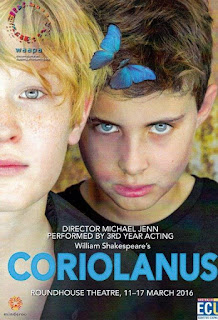The balance between those who seek to rule and the people
whose name they rule in has always been a fine one. Occasionally it tips violently
one way or another – into dictatorship or open revolt – as that balance is
disturbed. What is the responsibility of the politician versus the people in
this regard? Do political leaders tell the people what they want to hear to
gain their trust and more importantly their endorsement whether through formal
vote or fealty; or do they stick to their beliefs and principles removed from
such populist notions? And what of the people - is that trust and support given
only through self-interest or for a higher purpose such as the sanctity of the
nation when it is under threat, real or imagined?
These were some of the questions mulling through my mind as
I watched one of Shakespeare’s lesser known tragedies, Coriolanus. The
political intrigue is as potent today as when the play was written, now in the
shadow of what might yet prove to be the most contentious and divisive US
Presidential race in history.
At the centre of all this intrigue is Caius Martius (Angus
McLaren) who is named Coriolanus for his deeds as a Roman General in defeating the
hated Volsces. His domineering mother Volumnia (Anneliese
Apps) pushes for him to become Consul but it’s not in Coriolanus’ nature to humble
himself as is expected before the stratified Roman society of Senators,
Citizens and Tribunes, instead rebuking them. Two Tribunes (Kate Betcher and
Lukas Radovich) move popular opinion against him until he is pronounced banished.
Coriolanus leaves the city to seek out his former enemy led by Aufidius
(Alexander Daly) and together they march on Rome where Volumnia, his wife
(Sarah Greenwood), young son Martius, and family friend Valeria (Emma O’Sullivan)
wait to greet him in a desperate bid to save Rome from impending doom.
Coriolanus relents but in doing so is proclaimed traitor by Aufidius and
brutally slain.
I admit it took me a while to get into the story as I slowly
found my feet with the language, the roster of characters and opposing forces.
It was when Coriolanus, barefoot and dressed only in a robe, delivers himself
to the people in an attempt at humility that things clicked into place. Until
that point the proud soldier had been a physically stout presence and suitably
adorned with sword, shield and chainmail. To cast aside the proud and brutish
nature that had won him acclaim in order to become Consul was an intriguing
dilemma. To watch him reluctantly entertain this conceit before indulging in
mockery and then reject the people out of hand was fascinating. McLaren is
terrific in this sequence as he projects a slow burn of conflicting emotions at
the humiliating trial of approval until releasing Coriolanus’ complete disdain
and hubris. From then on I was hooked.
There is no doubt that McLaren is the driving force in a
terrific performance giving an ostensibly ‘unlikeable’ protagonist so many
wrinkles and contradictions. That the character’s undoing comes from betraying
his own nature in being persuaded to relent at the gates of Rome and that this
is induced by his mother is at the heart of the tragedy. McLaren gives
Coriolanus the air of a man supremely confident in his abilities, who doesn’t
suffer fools lightly, and who is quick to action with a sword the mostly likely
weapon of choice. His look of incredulity as the people demand the prospective Consul’s
banishment is matched by the contempt McLaren gives full throated voice to as
Coriolanus banishes Rome itself... from him. But there are also glimpses of the
good father and loving husband that round out a portrait of a complicated man
unwilling to bend to convention or expediency.
Apps proves to be a worthy match especially in the scene
where Volumnia beseeches Coriolanus not to sack the city. To watch such a
headstrong character subjugate herself, on her knees no less, was the parallel
to Coriolanus prostrating himself before Aufidius at the Volscian city. Daly’s
response to that moment was excellent in surprisingly embracing his hated foe with
genuine fervour. Betcher and Radovich play the Tribunes not so much as
conniving but totally naive to the ripple effects their machinations will
cause. The crumbling of their safe and confident attitudes on hearing of an
army headed by Coriolanus marching on Rome was writ large on their faces as was
the back peddling of the people as if trying to abrogate themselves of
responsibility.
Kieran Clancy-Lowe added an assured presence with a light comic
touch as Senator and friend to Coriolanus while there are colourful flourishes
by O’Sullivan as the kind-hearted family friend and Elle Mickel as a comical servant
in the Aufidius household.
The hardworking ensemble represented a variety of layers in
this fractious society – soldiers, the starving citizenry, servants and the
like. Director Michael Jenn gives them free rein in ramping up the pressure on
Coriolanus with raucous condemnation and occasional comic relief. The costuming
effectively recreates such a hierarchical and militaristic world while the drum
infused live music performed by Amelia Jutilane-Maynard and Arund Pearce provides
the piece with a ‘heartbeat’ as one actor commented at the Q&A afterwards. The
use of a vibraphone also added emotional depth to the more personal scenes
notably involving family members and loved ones. Then there are the swords fight coordinated by Fight Director Andy Fraser that are boisterous and brutal. The split lip McLaren was sporting after the show was testament to their energetic rendering.
It all ends with Coriolanus’ son (rotating between Darcy
Stokes and Oliver Haluszkiewicz on different nights) contemplatively swinging his
dead father’s sword. As one audience member remarked, we truly don’t learn from
history.
Written by William Shakespeare, Directed by Michael Jenn,
and featuring the third year graduating class, Coriolanus is on at The Roundhouse
Theatre until 17 March.

No comments:
Post a Comment